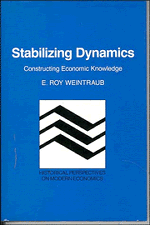8 - Conclusion
from Part II - From history to interpretation
Published online by Cambridge University Press: 04 August 2010
Summary
… but what is Whiggery?
A levelling, rancorous, rational sort of mind
That never looked out of the eye of a saint
Or out of a drunkard's eye.
…All's Whiggery now…
W. B. Yeats (1946, pp. 277–8)The history of economic thought as usually presented has a frankly Whiggish perspective in the sense that the narrative impels the reader to see how success was or was not reached in the particular paper or papers under discussion. Don Walker, in his recent presidential address to the History of Economics Society, made it explicit that “we judge economic writings in the light of modern economic knowledge…we use current knowledge to detect sound arguments and defective arguments” (Walker 1988, p. 101). Walker's paper and Samuelson's “Out of the Closet: A Program for the Whig History of Economic Science” (1987), define what most economists believe about the nature and use of histories of economics, and the history of science more generally. That is, in a brief caricature, that history must be a moral exemplar showing how scientists came to “get it right,” eventually, where the “right stuff” is called Truth. Thus, Walker states that the historian judges economic writings on the basis of criteria of originality, importance (as measured by impact on other, later writers), correspondence to current views, logical consistency, avoidance of false claims, and realism of the theories.
- Type
- Chapter
- Information
- Stabilizing DynamicsConstructing Economic Knowledge, pp. 149 - 152Publisher: Cambridge University PressPrint publication year: 1991



